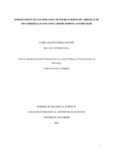| dc.description.abstract | Application of organic matter and use of mycorrhiza have been recommended as ways of improving plant growth and increasing yields. The aim of the study was to investigate the effect of organic amendments on colonisation of soybean roots by arbuscular mycorrhizal fungi. The study consisted of a field experiment of seven treatments with 3 replications in a complete randomized block design. The treatments were biochar (B), vermicompost (V), mycorrhiza (M), biochar and vermicompost (BV), biochar and mycorrhiza (BM), biochar, vermicompost and mycorrhiza (BVM), mycorrhiza and vermicompost (MV), and the control plot which had no treatments (NT). Uncultivated fallow land was subdivided into 21 sub-plots separated by 1m wide paths. Soil samples were collected for characterization of soil chemical properties and estimation of the population of mycorrhizal spores. The different amendments were applied to their respective subplots. Soybean seeds were then planted in each plot. At flowering time, roots were screened for percentage mycorrhizal colonisation and dry mass of sample soybean plants from each plot was taken. At harvest time, soil samples from each plot were collected and the dry weight of plants from each plot and harvested soybeans was taken. There was mean increase of 54% in levels of phosphorous and 15 % of carbon in the soil after application of amendments while levels of nitrogen decreased in all treatment plots. There was a significant (P<0.05) increase in arbuscular mycorrhizal fungi spores after application of the amendments. The colonization percentage of arbuscules in roots was highest (15%) in the BV plots while the control (NT) plots had the lowest colonization percentage of 1%. The highest dry weight of both shoots and roots were recorded in the B plot which also had a significantly higher yield of harvested soybean seeds than the control NT with a mean of 171g. Plots treated with mycorrhiza had a significantly lower (P<0.05) yield of soybean seeds with a mean of 58g. From this study it was concluded that the organic amendments enhanced the activity of the already-present mycorrhizal fungi in the soil, without requiring the introduction of commercial mycorrhizae and that biochar enhances microbial activity which stimulates crop productivity. It was recommended that organic amendments should be considered as agents for improving soil nutrient content and thus improve plant growth and yield.
Key words: Arbuscular mycorrhizal fungi, organic amendments, soybean, vermicompost, biochar. | en_US |



